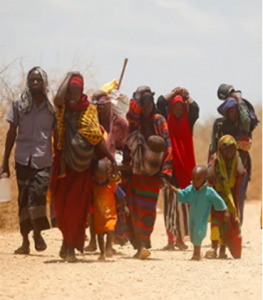Climate migration could cause population upheaval – World Bank
Climate change bringing rising sea levels, water scarcity and declining crop productivity could force 216 million people to migrate within their own countries by 2050, according to a new report from the World Bank.
The report says without immediate action to combat climate change, catastrophic environmental conditions could force whole populations to move.
 Titled ‘Groundswell 2.0’, the report modelled the impacts of climate change on six regions. If found that climate migration ‘hotspots’ will emerge as soon as 2030 and intensify by 2050, hitting the poorest parts of the world hardest.
Titled ‘Groundswell 2.0’, the report modelled the impacts of climate change on six regions. If found that climate migration ‘hotspots’ will emerge as soon as 2030 and intensify by 2050, hitting the poorest parts of the world hardest.
The report says Sub-Saharan Africa would account for 86 million of the internal migrants, with 19 million more in North Africa.
It says 40 million migrants were expected in South Asia and 49 million in East Asia and the Pacific.
“Such movements will put significant stress on both sending and receiving areas, straining cities and urban centres and jeopardising development gains,” the report said.
Sea-level rise threatens rice production, aquaculture and fisheries, which could create an out-migration hotspot in Vietnam’s low-lying Mekong Delta; and the Red River Delta and central coast region, where those people are likely to flee, face their own threats, including severe storms, it says.
Conflicts and health and economic crises such as those unleashed by the COVID-19 pandemic could compound the situation, the World Bank said.
And the number of climate migrants could be much higher since the report does not cover most high-income countries, countries in the Middle East and small island states, or migration to other countries.
The report says the findings should be seen as an urgent call to regional and national governments and the global community to act now to reduce greenhouse gases, close development gaps and restore ecosystems.
Doing so, they said, could reduce that migration number by 80 per cent to 44 million people.
“We’re already locked into a certain amount of warming, so climate migration is a reality,” said World Bank environmental spokesman Kanta Kumari Rigaud.
“We have to reduce or cut our greenhouse gases to meet the Paris target, because those climate impacts are going to escalate and increase the scale of climate migration,” Ms Rigaud said.
Read the full report: https://openknowledge.worldbank.org/handle/10986/36248












